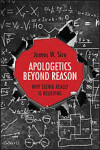

Reflection

Recently I found myself reading excerpts from James Sire’s book, Apologetics Beyond Reason. (You can read ESN’s review here). As someone with a literature background myself, I found Sire’s description of the purpose of literature, and an aesthetic experience through great literature as a pointer to the transcendent, very interesting. Sire says “When we read great literature’we are lifted out of ourselves into another world.” When we have an aesthetic experience through such literature, we have “direct perception” of God’s existence. Thus Sire enthuses, “There is the poetry of Gerard Manley Hopkins; therefore there is a God.”[1]
Now, according to Sire, there is no further argument to be had here. Either one “sees” God through such a literary experience, or one doesn’t. I find this all very fascinating, because I have had such experiences myself. One such experience occurred for me when I first heard Hopkins’ poetry.
Gerard Manley Hopkins, Sire explains, was a 19th century poet who attended Oxford, and although Anglican, converted to Catholicism around the same time as John Henry Newman. Hopkins became a Jesuit in 1868, and entered the priesthood in 1877. He wrote quite a bit of poetry, but it wasn’t published until 1918, about a generation after his death.
One of his most famous poems, “God’s Grandeur” is sublime not only in its sound, but its ideas:
The world is charged with the grandeur of God.
It will flame out, like shining from shook foil;
It gathers to a greatness, like the ooze of oil
Crushed. Why do men then now not reck his rod?
Generations have trod, have trod, have trod;
And all is seared with trade; Bleared, smeared with toil;
And wears man’s smudge and shares man’s smell: the soil
Is bare now, nor can foot feel, being shod.And for all this, nature is never spent;
There lives the dearest freshness deep down things;
And though the last lights off the black West went
Oh, morning, at the brown brink eastward, springs —
Because the Holy Ghost over the bent
World broods with warm breast and with ah! bright wings.
I remember when I first read this in an English class as an undergraduate. I was struck with its alliterative beauty, its rhyme and rhythm. And I was carried to another world. There is something transcendent about reading it, an aesthetic experience that is difficult to put into words. The amalgamation of the sound, the freshness of alliteration, together with the mystery of nature stirs a sublime concoction.
And of course, there is a Christian worldview to Hopkins’ poem, speaking of God’s grandeur and the Holy Spirit brooding over creation. But according to Sire, that is not the point. The point is the beauty itself, which may or may not support a Christian worldview (although it is always wonderful when it does). It is this aesthetic experience which points to something greater than ourselves.
A few years ago, I had a similar experience reading the prose of Christian Wyman, the poet and, until recently, editor of Poetry magazine. From the beginning, I was enamored with his prose and found myself repeatedly ruminating over it. “Love Bade Me Welcome” is Wiman’s now famous essay in which he chronicles his return to the faith of his childhood. In it, he beautifully describes when he met the woman who would later become his wife:
Then I fell in love. I say it suddenly, and there was certainly an element of radical intrusion and transformation to it, but the sense I have is of color slowly aching into things, the world coming brilliantly, abradingly alive. I remember tiny Albert’s Café on Elm Street in Chicago where we first met, a pastry case like a Pollock in the corner of my eye, sunlight suddenly more itself on an empty plate, a piece of silver. I think of walking together along Lake Michigan a couple of months later talking about a particular poem of Dickinson’s (“A loss of something ever felt I”), clouds finding and failing to keep one form after another, the lake booming its blue into everything’[2]
Again, one can hear the striking alliteration with words such as, “aching, abradingly alive,” “sunlight suddenly, silver,” and “the lake blooming its blue…” It simply overwhelms with poetic power. There is something transcendent about it.
Interestingly, in this same essay, Wiman mentions a transcendence, for him, in the composition of poetry rather than the reading of it:
I do think, though, that poetry is how religious feeling has survived in me. Partly this is because I have at times experienced in the writing of a poem some access to a power that feels greater than I am, and it seems reductive, even somehow a deep betrayal, to attribute that power merely to the unconscious or to the dynamism of language itself. But also, if I look back on the poems I’ve written in the past two decades, it almost seems as if the one constant is God. Or, rather, His absence.[3]
This “access to a power that feels greater than I” is similar, I think, to Sire’s aesthetic experience as a pointer to God. There is something Other. And, as Sire says, either you see this or you don’t.
May we all have God’s power to “see” Him in the Sublime.
Questions
Have you had an aesthetic experience that pointed you to the transcendent? What was it like?
Do you think that beauty can make us aware of God? Why or why not?
Do you think Sire is right that either you “see” God through an aesthetic experience, or you don’t? Can people who don’t immediately see God through such an experience learn to do so?
What is a favorite poem of yours? What is it about that poem that moves you?
Are there other types of literature that move you? Novels or plays? What is your favorite form of art? Why?
For Further Reading
Sire, James. Apologetics Beyond Reason. Downers Grove, IL: InterVarsity Press, 2014.
Phillips, Catherine, ed. Gerard Manley Hopkins: The Major Works. Oxford: Oxford University Press, 2009.
Wiman, Christian. “Love Bade Me Welcome,” in Ambition and Survival: Becoming a Poet. Port Townshend, WA: Copper Canyon Press, 2007. 239-245.
Wiman, Christian. My Bright Abyss: Meditation of a Modern Believer. New York: Farrar, Strauss and Giroux, reprint, 2014.
Notes
[1] This is Sire’s tweak on an argument by Peter Kreeft in Handbook of Christian Apologetics, p. 81. For the analysis of Gerard Manley Hopkins’ poetry, see Sire, Apologetics Beyond Reason, pp. 74-77.
[2] Christian Wiman, “Love Bade Me Welcome,” in Ambition and Survival: Becoming a Poet. p. 241.
[3] Ibid., p. 239.
Mark is on staff with InterVarsity Christian Fellowship in Manhattan, Kansas, where he ministers to Faculty at Kansas State University and surrounding campuses. He has been in campus ministry 25 years, 14 of those years in faculty ministry. He has a Master’s degree in philosophy and theology from Talbot School of Theology, La Mirada, CA, and is passionate about Jesus Christ and the life of the mind. Mark, his wife and three daughters make their home in Manhattan.

Leave a Reply